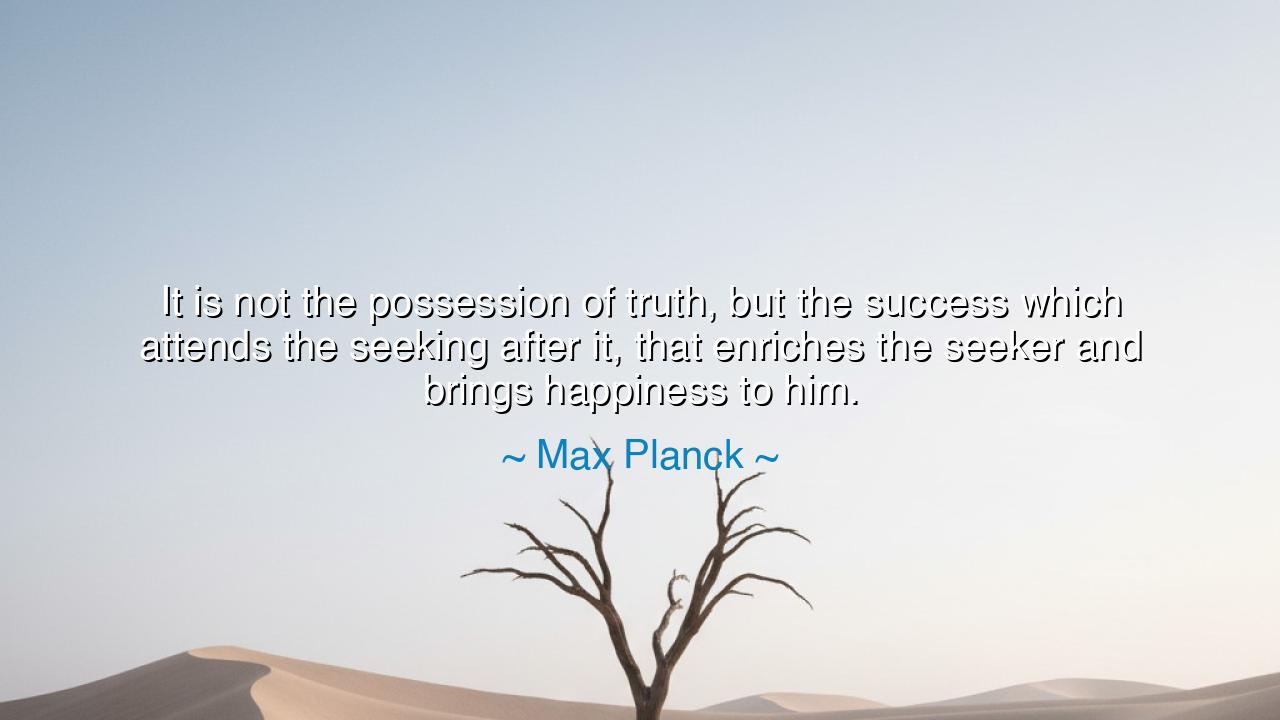
It is not the possession of truth, but the success which attends
It is not the possession of truth, but the success which attends the seeking after it, that enriches the seeker and brings happiness to him.






When Max Planck, the father of quantum theory, wrote, “It is not the possession of truth, but the success which attends the seeking after it, that enriches the seeker and brings happiness to him,” he revealed the spirit that has guided all true thinkers, artists, and seekers of wisdom since time began. His words are not only about science, but about the human journey itself — the endless striving for meaning, understanding, and transcendence. Planck, who devoted his life to uncovering the mysteries of the universe, knew that truth, like a star, can be approached but never fully possessed. What gives life its beauty, its dignity, and its joy, is not to hold the star in one’s hand, but to walk under its light, to seek it with an open heart, and to be transformed by the pursuit itself.
Planck lived in an age of revolution — not of swords and empires, but of thought. The 20th century dawned with discoveries that shattered centuries of certainty. He stood at the threshold between the old physics of Newton and the new world of the quantum, where mystery deepened rather than dissolved. Yet even as he unveiled laws that would change human understanding forever, he knew that science could never claim absolute truth — only ever-closer glimpses of it. The joy he spoke of was not the pride of mastery, but the humility of wonder. For Planck understood that truth is infinite, and the mind that chases it is enriched by the chase itself.
This wisdom is not confined to laboratories or universities. The ancients too knew this path. Socrates, the father of philosophy, declared that “the only true wisdom is in knowing you know nothing.” He wandered the streets of Athens not as a possessor of truth, but as a lover of it, questioning, seeking, forever unsatisfied yet forever fulfilled by the quest. In every generation, the greatest minds have shared this same fire — from Galileo, who faced imprisonment for daring to look through his telescope, to Einstein, who spent his life unraveling the fabric of space and time, yet confessed, “The more I learn, the more I realize how much I don’t know.” Their happiness, like Planck’s, came not from conquest, but from curiosity — the endless unfolding of revelation.
The human spirit, in its purest form, was never meant for completion, but for seeking. The pursuit of truth — whether scientific, artistic, or spiritual — is an act of faith and courage. To seek is to admit that we do not know, and yet to walk forward anyway. The possession of truth, when claimed too easily, often hardens the soul; it breeds arrogance and stagnation. But the pursuit of truth softens the heart, opens the mind, and keeps the spirit young. Each discovery, each insight, each small illumination enriches the seeker — not because he has conquered the unknown, but because he has grown in the process of facing it.
Consider the story of Marie Curie, who spent long, grueling years in a cold shed, refining tons of pitchblende to isolate radium. She endured sickness, poverty, and isolation, yet her eyes burned with the light of discovery. The truth she sought came slowly, painfully — but her joy did not wait for the end. It lived in every experiment, every glimmer of progress, every moment of insight. Her happiness was not in possession, but in participation — in being part of the great conversation between the human mind and the universe. In her life, we see Planck’s wisdom embodied: that the success of seeking is measured not by what one finds, but by what one becomes.
And so, Planck’s words speak to us all — not just to scientists, but to anyone who strives, questions, and learns. The artist who paints, the writer who wrestles with words, the teacher who ignites curiosity in young minds — all are seekers. Each step toward understanding, however small, is sacred. For in seeking truth, we draw nearer to what is divine in us. The act of seeking refines the soul, burns away illusion, and awakens gratitude for the mystery itself. To seek is to live; to stop seeking is to die long before death.
Therefore, my listener, take this lesson as a lamp for your path: Do not crave to possess truth — crave to pursue it. Do not despair when answers elude you; rejoice that questions still stir your spirit. Let the search itself be your teacher, your joy, and your reward. Every step toward truth, however uncertain, strengthens the soul and makes life radiant. Remember Max Planck’s immortal wisdom: Happiness is not the crown of the one who knows, but the companion of the one who seeks. Walk, then, as a seeker — humble, steadfast, and aflame with wonder — for in the seeking lies the very essence of being alive.






AAdministratorAdministrator
Welcome, honored guests. Please leave a comment, we will respond soon